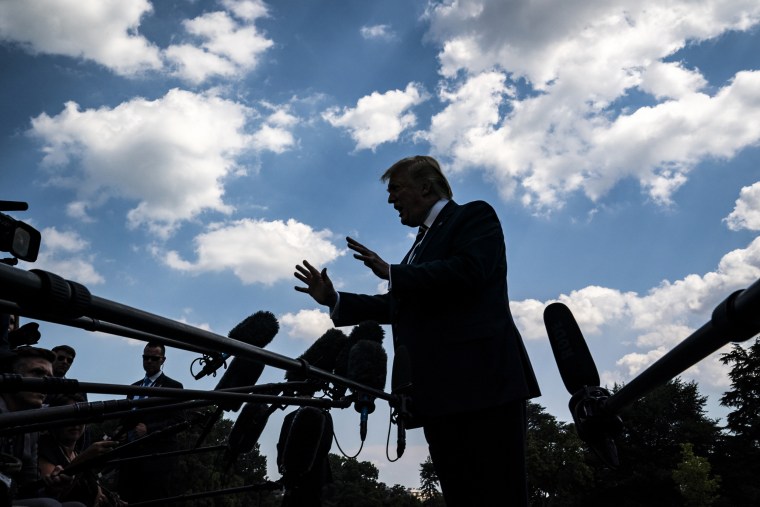Today is the fourth time in a little more than four months that former President Donald Trump will turn himself in to authorities after being accused by a grand jury of committing multiple felonies. This time, of course, Trump will be in Atlanta to be booked at the Fulton County Jail. Last week, a grand jury in that Georgia county pushed the total number of felony charges against him to 91. Because he’s surrendered to authorities three times already, many Americans may be of the opinion that this case will unfold just like the previous three.
The question of whether to allow cameras in a criminal trial can be tricky because of two different — and sometimes conflicting — constitutional interests.
However, unlike the two federal cases and the New York state case against Trump, there is a key difference in Georgia that could greatly impact how the case unfolds and how the public interacts with it. In Georgia, there will almost certainly be cameras inside the courtroom. On Tuesday, Fulton County Judge Scott McAfee, who has been assigned to the case, approved a request from four Atlanta television stations to allow cameras in his courtroom when Trump is arraigned.
The United States judicial system has a patchwork of policies on cameras in judicial proceedings. Federal courts tend to be more restrictive, particularly in criminal trials. And while all 50 states allow cameras in courtrooms in some capacity, the rules vary from state to state and even from courtroom to courtroom. But the law in Georgia strongly favors camera access.
The question of whether to allow cameras in a criminal trial can be tricky because of two different — and sometimes conflicting — constitutional interests. The first is the First Amendment rights of access of the public and the media to the criminal justice system. The second is the criminal defendant’s Sixth Amendment right to a fair trial.
Open and public trials are a bedrock of American democracy. The U.S. Supreme Court has declared that “what transpires in the court room is public property” and that “people in an open society do not demand infallibility from their institutions, but it is difficult for them to accept what they are prohibited from observing.” Sometimes there’s no conflict between the public’s right to observe and the defendant’s right to a fair trial, but the Supreme Court has also recognized that broad media access to trials, including the use of cameras, can potentially interfere with a defendant’s due process rights by exacerbating the public spectacle of high-profile cases and prejudicing the jury.
The other cases against Trump, of course, will not be held in secret. Journalists will report on the events, transcripts of the proceedings may be released, and courtroom sketch artists will provide images. But it is an entirely different experience to see and hear an event directly than it is to be told about it. Video is the closest technology we have that can effectively put the public inside the courtroom, and it has the most impact because it is experienced in a way closest to real life.
So what will it mean to have video of Trump’s criminal case in Georgia?
With cameras, the public will be able to see and hear firsthand all the evidence against the former president. Viewers will be able to observe facial expressions, gestures, body language, physical appearances or signs of emotion from Trump and everyone else in the courtroom. They will be able to judge for themselves whether they think a witness appears credible, whether a lawyer’s arguments are effective or if the judge’s demeanor seems fair.
With cameras, the public will be able to see and hear firsthand all the evidence against the former president.
An interested viewer can watch the proceedings “gavel to gavel,” rather than wonder if any individual report was misleading or taken out of context.
Additionally, streaming or televising a trial is a more accessible format than other methods of communication for many Americans. Video is more likely to reach a broad and diverse audience, meaning not only that more Americans will likely follow the Georgia trial, but also that a broader cross section of Americans will be paying attention.
With this heightened impact, however, comes heightened concerns about the integrity of the process. The same technology that can make video coverage more complete and effective can also be abused to mislead and distort. Video can be spliced into secondslong clips and removed from context. In the 2022 defamation trial between actors Johnny Depp and his ex-wife Amber Heard, for example, video snippets — many of which were used to spread misleading or false information about the trial — were shared or viewed on social media billions of times.
Ultimately, the greatest concern is that coverage of the trial will find its way into the jury box and interfere with the fairness of the trial. It will be the judge’s job to think seriously about taking steps to safeguard the process, such as sequestering the jury.
The public has a constitutional right to observe its criminal justice system in action. And it is hard to imagine a case of higher public concern than allegations that a then-president attempted to disenfranchise thousands of voters and overturn the outcome of an election. Georgia’s law allowing cameras in courtrooms raises the risk of Trump’s likely trial becoming a spectacle, but if handled correctly the presence of those cameras can let Americans decide for themselves whether they think justice is being served.
